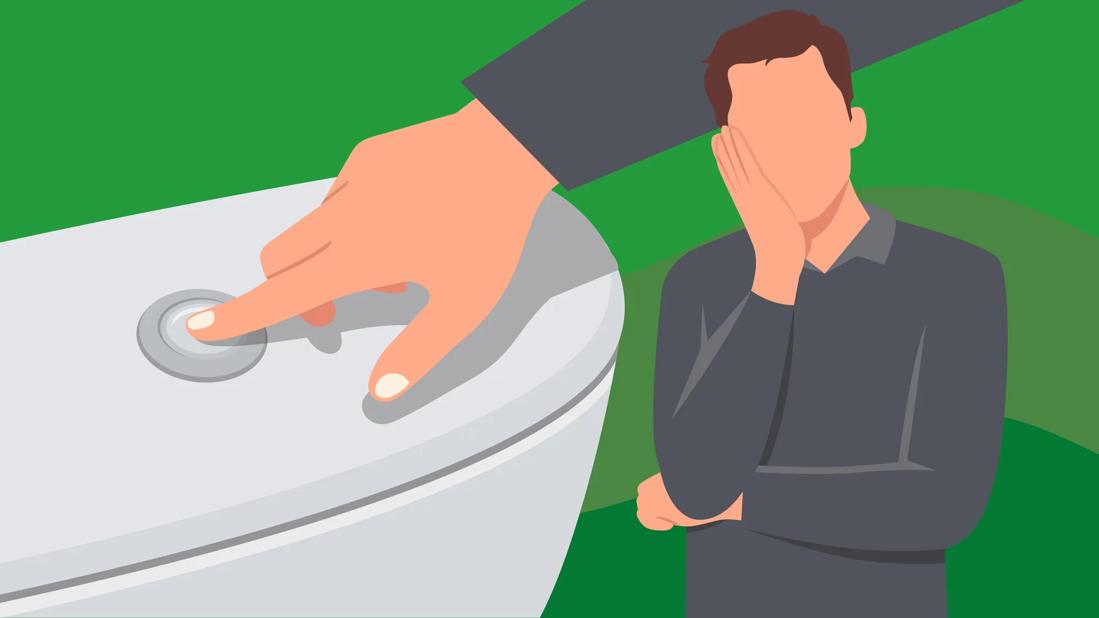There’s usually a simple answer, like what you ate, but the color can also be a cause for concern

Image content: This image is available to view online.
View image online (https://assets.clevelandclinic.org/transform/2615e9ea-30f2-4483-b26e-7b85576bdd06/toilet-flush-green-poop-1427881989)
Person wondering, with hand pushing flush button on toilet, green background
There’s an expectation as to what you’ll see in the toilet after pooping. While most poop tends to be a shade of brown, there may be times when you look down into the water and wonder: Why is my poop green?
Advertisement
Cleveland Clinic is a non-profit academic medical center. Advertising on our site helps support our mission. We do not endorse non-Cleveland Clinic products or services. Policy
A surprise color on its own usually isn’t a reason to be alarmed. It does signal that something different is happening deep in your innards, but odds are that “something different” isn’t something bad. It may be from food, medication or a gastrointestinal (GI) condition.
“The color and shade of a bowel movement can vary day by day,” says gastroenterologist Christine Lee, MD. “It’s like life — always changing and never exactly the same.”
So, what does green poop mean? Let’s look at some potential Technicolor® triggers.
What you’re eating is the most likely explanation for green poop, especially if you tend to nibble on garden fare, like broccoli, kale and spinach. The chlorophyll that gives those vegetables their green color can do the same to your poop.
Other potential food and drink sources that could make you “go green” include:
A food-fueled tint should disappear within a day or two once the source is flushed out of your system, says Dr. Lee.
A less organic force — green food dye — could also be behind a Hulk-like hue on a No. 2, says Dr. Lee. (Consider this a consequence of eating a St. Patrick’s Day cupcake with unnaturally bright green frosting.)
Advertisement
Blue or purple food dyes also may turn your output a bit greenish as your digestive juices mix with the color additives.
Your poop color should return to a more boring brown once a dye source leaves your system.
Antibiotics can lead to small, and potentially colorful, changes to the way your body digests food. The reason? The medication can alter your gut flora, which can add a greenish tint to what comes out.
Some medications may upset your stomach, too, resulting in bile-filled diarrhea that looks a bit green, notes Dr. Lee.
“Turning green” has long been a phrase used to describe someone showing signs of an illness. The same can be said of your poop, shares Dr. Lee.
Greenish stool could indicate that you have a:
In some cases, green poop also could be a symptom of:
Removal of your gall bladder may also temporarily send more bile into your digestive tract, which can lead to greenish diarrhea.
But one word of caution before you start fretting.
“All of these issues are possible, but they’re not the norm,” clarifies Dr. Lee. “If you feel perfectly fine and don’t have diarrhea, a different color bowel movement is most likely linked to something you ate.”
As mentioned, colorful poop isn’t all that unique and is usually connected to something you ate. Think about what recently passed through your lips and you’ll probably come up with a simple reason for the burst of color.
That said, oddly colored poop might indicate something needs attention, particularly if it lingers or comes with symptoms like:
Pale poop or blood-tinged stool is of particular concern, too.
Call a doctor if symptoms fail to improve or resolve completely.
“Pay attention to your bowel movements, but don’t worry too much if you see something unusual for a day,” reiterates Dr. Lee. “There’s usually a very clear explanation that involves something you ate.”
Advertisement

Sign up for our Health Essentials emails for expert guidance on nutrition, fitness, sleep, skin care and more.
Learn more about our editorial process.
Advertisement
Excess mucus, ulcers, a high-fat diet and pancreatic conditions can make stool sticky
Diet offers a rainbow of possibilities when it comes to the hue of your stool
If it’s brown, yellow or green, there’s typically no need to worry, but call your pediatrician if your little one’s stool is red, black or white
Everyone poops, but here’s what may affect how often you visit the toilet
Your #2 can be the #1 sign of a medical issue
The short answer from a registered dietitian
5 tips to keep your bowels healthy
Most of the time, beeturia is a curiosity, not a concern
Prioritize your health by managing stress, strengthening your social connections and getting quality sleep
Bolsters, blankets, pillows and blocks can offer extra support, stability and comfort
Allergies, postnasal drip, asthma or reflux could be to blame for a cough that won’t quit